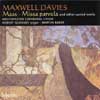Maxwell Davies Sacred Choral Music
A challenging Mass with magical effects crowns an outstanding disc from this choir
View record and artist detailsRecord and Artist Details
Composer or Director: Peter Maxwell Davies
Genre:
Vocal
Label: Hyperion
Magazine Review Date: 7/2004
Media Format: CD or Download
Media Runtime: 67
Mastering:
Stereo
DDD
Catalogue Number: CDA67454

Tracks:
| Composition | Artist Credit |
|---|---|
| Missa parvula |
Peter Maxwell Davies, Composer
Martin Baker, Conductor Peter Maxwell Davies, Composer Robert Quinney, Organ Westminster Cathedral Choir (Boys' Voices) |
| Veni Creator Spiritus |
Peter Maxwell Davies, Composer
Peter Maxwell Davies, Composer Robert Quinney, Organ |
| Dum complerentur |
Peter Maxwell Davies, Composer
Martin Baker, Conductor Peter Maxwell Davies, Composer Westminster Cathedral Choir |
| Reliqui Domum Meum |
Peter Maxwell Davies, Composer
Peter Maxwell Davies, Composer Robert Quinney, Organ |
| Veni Sancte Spiritus |
Peter Maxwell Davies, Composer
Martin Baker, Conductor Peter Maxwell Davies, Composer Westminster Cathedral Choir |
| Mass |
Peter Maxwell Davies, Composer
Martin Baker, Conductor Peter Maxwell Davies, Composer Robert Houssart, Organ Robert Quinney, Organ Westminster Cathedral Choir |
Author: Marc Rochester
Under David Hill and subsequently James O’Donnell the choir of Westminster Cathedral established a tradition of excellent recordings for Hyperion. It’s good to be able to report that under Martin Baker, who assumed the role of Master of the Music early in 2000, that tradition is as strong as ever. Like his immediate predecessors, Baker is exploring repertoire which is not just challenging and unusual but of real value; this is music which is well worth recording with the added bonus of being previously unrecorded.
The Missa parvula for unison boys’ voices vividly recalls, both in its terse musical language and understated emotion, Britten’s Missa Brevis; and, for those whose memory stretches back that far, the connection is even more marked since Baker produces from his boys a quality of tone strikingly similar to that of the days of George Malcolm, for whom Britten composed his work.
In a curious misjudgement Hyperion has programmed the two large Mass settings side by side, leaving the shorter motets and organ solos in a cluster at the end of the disc. It makes for unsatisfactory listening for those not prepared to devote valuable listening time to reprogramming their CD players. The opening of the Mass occupies the same sound-world as the Missa parvula and it is only with the thrilling and lavishly scored Gloria that it is apparent we are now into a work of much greater depth and impact. This is a hugely impressive performance, as much for the astonishing effect of the two organs as for the often magical choral effects. Baker entices some of the most wonderful singing from his choir here while Roberts Quinney and Houssart positively revel in their virtuoso interplay. It almost goes without saying that Hyperion’s recording captures the full effect of Maxwell Davies’ astonishing writing.
A revelatory disc for those keen to know what sort of ‘establishment’ music we might expect from the new Master of the Queen’s Music.
The Missa parvula for unison boys’ voices vividly recalls, both in its terse musical language and understated emotion, Britten’s Missa Brevis; and, for those whose memory stretches back that far, the connection is even more marked since Baker produces from his boys a quality of tone strikingly similar to that of the days of George Malcolm, for whom Britten composed his work.
In a curious misjudgement Hyperion has programmed the two large Mass settings side by side, leaving the shorter motets and organ solos in a cluster at the end of the disc. It makes for unsatisfactory listening for those not prepared to devote valuable listening time to reprogramming their CD players. The opening of the Mass occupies the same sound-world as the Missa parvula and it is only with the thrilling and lavishly scored Gloria that it is apparent we are now into a work of much greater depth and impact. This is a hugely impressive performance, as much for the astonishing effect of the two organs as for the often magical choral effects. Baker entices some of the most wonderful singing from his choir here while Roberts Quinney and Houssart positively revel in their virtuoso interplay. It almost goes without saying that Hyperion’s recording captures the full effect of Maxwell Davies’ astonishing writing.
A revelatory disc for those keen to know what sort of ‘establishment’ music we might expect from the new Master of the Queen’s Music.
Discover the world's largest classical music catalogue with Presto Music.

Gramophone Digital Club
- Digital Edition
- Digital Archive
- Reviews Database
- Full website access
From £8.75 / month
Subscribe
Gramophone Full Club
- Print Edition
- Digital Edition
- Digital Archive
- Reviews Database
- Full website access
From £11.00 / month
Subscribe
If you are a library, university or other organisation that would be interested in an institutional subscription to Gramophone please click here for further information.




